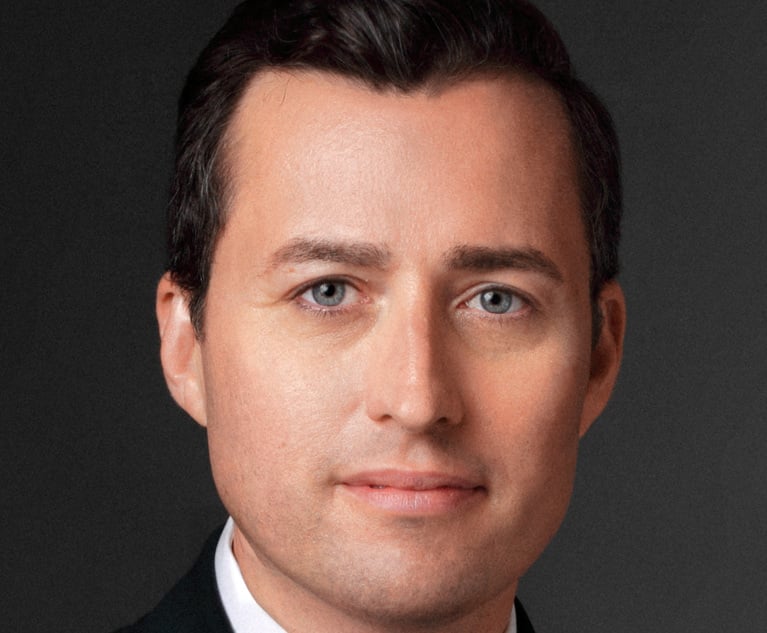What Does (and Does Not) Constitute Insurance Broker Liability in New York
There are certain circumstances under New York law in which an insurance agent or broker can be potentially liable for failing to procure coverage on behalf of its insured.
February 08, 2019 at 03:10 PM
8 minute read
 There are at least two questions that insureds should ask upon receiving a letter denying coverage for a claim or learning of the absence of a particular type of coverage that would have otherwise covered the claim: (1) Was the insurer's denial of coverage supported by the terms and conditions of the policy?; and (2) Is my broker liable for the damages resulting from the absence of coverage? Answering the first question in the affirmative does not necessarily mean a “yes” answer to the second question. There are certain circumstances under New York law in which an insurance agent or broker can be potentially liable for failing to procure coverage on behalf of its insured.
There are at least two questions that insureds should ask upon receiving a letter denying coverage for a claim or learning of the absence of a particular type of coverage that would have otherwise covered the claim: (1) Was the insurer's denial of coverage supported by the terms and conditions of the policy?; and (2) Is my broker liable for the damages resulting from the absence of coverage? Answering the first question in the affirmative does not necessarily mean a “yes” answer to the second question. There are certain circumstances under New York law in which an insurance agent or broker can be potentially liable for failing to procure coverage on behalf of its insured.
NY Law Governing Insurance Broker Liability
“As a general principle, insurance brokers have a common-law duty to obtain requested coverage for their clients within a reasonable time or inform the client of the inability to do so; however, they have no continuing duty to advise, guide or direct a client to obtain additional coverage.” Hefty v. Paul Seymore Ins. Agency, 163 A.D.3d 1376, 1377 (3d Dep't 2018) (citing Voss v. Netherlands Ins. Co., 22 N.Y.3d 728, 734 (2014)). In other words, as a general matter, a broker is not obligated to affirmatively contact its client and suggest the procurement of a particular type or amount of coverage. “Hence, in the ordinary broker-client setting, the client may prevail in a negligence action only where it can establish that it made a particular request to the broker and the requested coverage was not procured.” Id. at 735.
“When an insurance agent undertakes to obtain a policy of insurance for a client, the agent may be held liable for neglect if it fails to procure such a policy.” Tucci v. Hartford Cas. Ins. Co., 167 A.D.2d 387, 388 (2d Dep't 1990) (granting summary judgment to insured); Brian Fay Constr. v. Morstan Gen. Agency, 90 A.D.3d 796, 798 (2d Dep't 2011) (“an insurance broker who negligently fails to procure requested insurance stands in the shoes of the insurer”).
|The 'Special Relationship' Standard
Not surprisingly, many broker claims do not simply involve an insured's specific request for a particular type or amount of coverage and the broker's corresponding failure to acquire that coverage. Oftentimes, an insured's theory of liability against a broker will allege that the broker should have, to some extent, provided more advice, guidance or direction. In that case, an insured will generally be required to establish the existence of a “special relationship” with its broker.
“Where a special relationship develops between the broker and client, … that … broker may be liable, even in the absence of a specific request, for failing to advise or direct the client to obtain additional coverage.” Voss, 22 N.Y.3d at 735 (citing cases) (holding that the evidence, viewed in the light most favorable to the insured, “suggests that 'there was some interaction regarding a question of … coverage, with the insured relying on the expertise of the agent.'” Id. (citing Murphy v. Kuhn, 90 N.Y.2d 266, 272 (1997)).
In Murphy, the Court of Appeals identified three “exceptional situations” which potentially establish the existence of a special relationship. They are: “(1) the agent receives compensation for consultation apart from payment of the premiums; (2) there was some interaction regarding a question of coverage, with the insured relying on the expertise of the agent; or (3) there is a course of dealing over an extended period of time which would have put objectively reasonable insurance agents on notice that their advice was being sought and specially relied on.” Id. (internal quotation marks and citation omitted).
The Court of Appeals has held that “special relationships in the insurance brokerage context are the exception, not the norm[.]” Voss, 22 N.Y.3d at 736. However, astute counsel can often discover evidence that, at a minimum, creates an issue of fact, thereby leaving it to the finder of fact as to whether such a relationship exists.
|Statute of Limitations and Accrual Considerations
“An insurance agent or broker … may be held liable under theories of breach of contract or negligence for failing to procure insurance.” Bedessee Imports, Inc. v. Cook, Hall & Hyde, Inc., 45 A.D.3d 792, 793 (2d Dep't 2007) (citing cases). In other words, “[a]n insured must show that the agent or broker failed to discharge the duties imposed by the agreement to obtain insurance, either by proof that it breached the agreement or because it failed to exercise due care in the transaction.” Id. at 793-94 (citing cases).
However, for purposes of calculating the applicable statute of limitations, insurance agents and brokers are not “professionals” so the limitations period under CPLR §214(6) does not apply. Chase Sci. Research v. NIA Grp., 96 N.Y.2d 20 (2001). Suits against agents and brokers are subject to a three-year statute of limitations for negligence claims (CPLR §214(4)) and a six-year statute of limitations for breach of contract claims (CPLR §213(2)). Cunningham v. Ins. Co. of N. Am., No. 04 CV 2997 RJD VVP, 2006 WL 2568464 (E.D.N.Y. Aug. 31, 2006) (citing cases).
New York's “continuous representation” doctrine also does not apply to brokers. Eastman Kodak Co. v. Prometheus Funding, 283 A.D.2d 216 (1st Dep't 2001). This is particularly important because, for example, “annual renewals, effected with no further discussions between plaintiff the broker … constitute only new instances of damage, and are therefore irrelevant for limitations analysis.” Hudson Envelope v. Klausner, 249 A.D.2d 31 (1st Dep't 198). It is also important because a “breach of contract cause of action accrues at the time of the breach” and “knowledge of the occurrence of the wrong on the part of the plaintiff is not necessary to start the Statute of Limitations running in a contract action.” Ely-Cruikshank Co. v. Bank of Montreal, 81 N.Y.2d 399, 402 (1993).
Courts that have considered when a claim against a broker accrues have reached varying conclusions. Some courts have held that it accrues when the broker fails to procure the proper coverage. See, e.g., One Beacon Ins. v. Terra Firma Constr. Mgmt. & Gen. Contracting, No. 02 Civ. 7492(SAS), 2004 WL 369273, at *3 (S.D.N.Y. Feb. 26, 2004) (holding that the statute of limitations barred the negligence claim against an insurance broker because such a claim “accrues when the wrongdoing occurs and not when the wrongdoing is discovered” and the “latest possible date of wrongdoing … was the date that the First [insurance] Policy was procured.”); Morse Diesel Int'l. v. CNA Ins. Cos., 272 A.D.2d 455, 456 (2d Dep't 2000) (holding that “the cause of action against the [insurance brokers] accrued when the allegedly negligent acts or omissions occurred, that is, when the appellants failed to have [the plaintiff] named as an additional insured … not when [the insurer] disclaimed coverage”).
Other courts have held that it accrues when the plaintiff suffers the loss or when the insurer denies coverage because a claim cannot accrue until an injury is sustained. See, e.g., Pulte Grp. v. Frank Crystal & Co., No. 11 Civ. 6214(LAK), 2012 WL 1372158, at *2 (S.D.N.Y. April 18, 2012) (“In the specific context of a claim for the negligent failure of an insurance broker to procure the coverage sought by its client,” the cause of action accrues only when an injury is sustained, which here “occurs when the carrier disclaims liability.”); Bonded Waterproofing Servs. v. Anderson-Bernard Agency, 86 A.D.3d 527 (2d Dep't 2011) (finding that where a claim against an insurance agent or broker for the failure to obtain proper insurance coverage sounds in tort, the injury occurred and the plaintiffs were damaged when coverage was denied); Lavandier v. Landmark Ins. Co., 26 A.D.3d 264 (1st Dep't 2006) (holding that the negligence claim against an insurance broker accrued “not at the time of the alleged breach of duty but, subsequently, at the time of injury, i.e., in June 2001 when [the insurer] disclaimed [coverage].”) (citation omitted).
|Conclusion
A number of prompt inquires must be made during the initial assessment of a potential broker liability case. A matter not involving the failure to procure a specifically requested coverage may require the existence of a special relationship with the broker. In either scenario, counsel should also promptly assess the potential theories of liability which, in turn, will require an equally prompt analysis of when the applicable statute of limitations accrued.
Jeffrey L. Schulman is a partner in Pasich LLP's New York office.
This content has been archived. It is available through our partners, LexisNexis® and Bloomberg Law.
To view this content, please continue to their sites.
Not a Lexis Subscriber?
Subscribe Now
Not a Bloomberg Law Subscriber?
Subscribe Now
NOT FOR REPRINT
© 2024 ALM Global, LLC, All Rights Reserved. Request academic re-use from www.copyright.com. All other uses, submit a request to [email protected]. For more information visit Asset & Logo Licensing.
You Might Like
View All
Insurance Company Sues Over 180 Health Care Providers for Fraud Under RICO
3 minute read
New York Court of Appeals Tightens Pleading Standards Against Insurance Policyholder
7 minute read
Amid Growing Litigation Volume, Don't Expect UnitedHealthcare to Change Its Stripes After CEO's Killing
6 minute read
GE Agrees to $362.5M Deal to End Shareholder Claims Over Power, Insurance Risks
2 minute readTrending Stories
- 1'Largest Retail Data Breach in History'? Hot Topic and Affiliated Brands Sued for Alleged Failure to Prevent Data Breach Linked to Snowflake Software
- 2Former President of New York State Bar, and the New York Bar Foundation, Dies As He Entered 70th Year as Attorney
- 3Legal Advocates in Uproar Upon Release of Footage Showing CO's Beat Black Inmate Before His Death
- 4Longtime Baker & Hostetler Partner, Former White House Counsel David Rivkin Dies at 68
- 5Court System Seeks Public Comment on E-Filing for Annual Report
Who Got The Work
Michael G. Bongiorno, Andrew Scott Dulberg and Elizabeth E. Driscoll from Wilmer Cutler Pickering Hale and Dorr have stepped in to represent Symbotic Inc., an A.I.-enabled technology platform that focuses on increasing supply chain efficiency, and other defendants in a pending shareholder derivative lawsuit. The case, filed Oct. 2 in Massachusetts District Court by the Brown Law Firm on behalf of Stephen Austen, accuses certain officers and directors of misleading investors in regard to Symbotic's potential for margin growth by failing to disclose that the company was not equipped to timely deploy its systems or manage expenses through project delays. The case, assigned to U.S. District Judge Nathaniel M. Gorton, is 1:24-cv-12522, Austen v. Cohen et al.
Who Got The Work
Edmund Polubinski and Marie Killmond of Davis Polk & Wardwell have entered appearances for data platform software development company MongoDB and other defendants in a pending shareholder derivative lawsuit. The action, filed Oct. 7 in New York Southern District Court by the Brown Law Firm, accuses the company's directors and/or officers of falsely expressing confidence in the company’s restructuring of its sales incentive plan and downplaying the severity of decreases in its upfront commitments. The case is 1:24-cv-07594, Roy v. Ittycheria et al.
Who Got The Work
Amy O. Bruchs and Kurt F. Ellison of Michael Best & Friedrich have entered appearances for Epic Systems Corp. in a pending employment discrimination lawsuit. The suit was filed Sept. 7 in Wisconsin Western District Court by Levine Eisberner LLC and Siri & Glimstad on behalf of a project manager who claims that he was wrongfully terminated after applying for a religious exemption to the defendant's COVID-19 vaccine mandate. The case, assigned to U.S. Magistrate Judge Anita Marie Boor, is 3:24-cv-00630, Secker, Nathan v. Epic Systems Corporation.
Who Got The Work
David X. Sullivan, Thomas J. Finn and Gregory A. Hall from McCarter & English have entered appearances for Sunrun Installation Services in a pending civil rights lawsuit. The complaint was filed Sept. 4 in Connecticut District Court by attorney Robert M. Berke on behalf of former employee George Edward Steins, who was arrested and charged with employing an unregistered home improvement salesperson. The complaint alleges that had Sunrun informed the Connecticut Department of Consumer Protection that the plaintiff's employment had ended in 2017 and that he no longer held Sunrun's home improvement contractor license, he would not have been hit with charges, which were dismissed in May 2024. The case, assigned to U.S. District Judge Jeffrey A. Meyer, is 3:24-cv-01423, Steins v. Sunrun, Inc. et al.
Who Got The Work
Greenberg Traurig shareholder Joshua L. Raskin has entered an appearance for boohoo.com UK Ltd. in a pending patent infringement lawsuit. The suit, filed Sept. 3 in Texas Eastern District Court by Rozier Hardt McDonough on behalf of Alto Dynamics, asserts five patents related to an online shopping platform. The case, assigned to U.S. District Judge Rodney Gilstrap, is 2:24-cv-00719, Alto Dynamics, LLC v. boohoo.com UK Limited.
Featured Firms
Law Offices of Gary Martin Hays & Associates, P.C.
(470) 294-1674
Law Offices of Mark E. Salomone
(857) 444-6468
Smith & Hassler
(713) 739-1250






